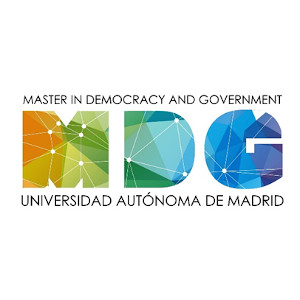MASTER IN DEMOCRACY AND GOVERNMENT
- Presentation
- Study plan 2024-2025
- Practical information
- Coordinator
- Teaching staff
- Admission and registration
- Master's thesis
- Quality

Basic information
- Title: Master in Democracy and Government
- Coordinator: Dr. Anne-Marie Reynaers
- Núm. ECTS: 60
- Duration: 1 year
- Language: All courses are taught in English. Students may choose to hand-in written assignments in English or Spanish.
- Modality: On campus
- Number of places: 30
- Price: 1st enrolment:
- Nationals and residents: €2,736.00
- Non-EU, non-residents: €5,079.00
- Classes: 15:00-19:00
The MSc programme Democracy and Governance (60 ECTS) provides you with the theoretical knowledge and analytical skills needed to assess important issues in Public Policy and Administration, Political Theory and Political Behavior. In the course of the year, you will get acquainted with the most important developments in these fields while gaining specialized knowledge and skills in areas such as:
- Qualitative and Quantitative methods
- The European Union
- Representation and Political Participation
- Nationalism, Political Theory and History of Political Thought
- Public Administration, Public Policy, and Public Management
- Elections and Electoral behavior
The English taught programme provides ample opportunities to pursue individual knowledge and research interests through electives. For the master’s thesis, you may choose to either follow the Research or the Internship track. Your studies will prepare you for a career in academic or applied research, consultancy, government, or the public sector at large.
Our programme offers an ideal environment for your studies, including:
- Small class sizes and group work.
- A carefully selected group of students representing diverse academic and cultural backgrounds.
- Committed and engaging Spanish and international and teachers with significant professional experience as researchers, advisors, and consultants.
- An ample offer of academic and social activities.
Structure study plan
Students follow 4 compulsory courses (36 ECTS). For the remaining 24 ECTS, students can select elective courses from the official study plan of the Master. After approval by the coordinator of the MA in Democracy and Government, students may select courses from other official UAM Master’s Degrees to a maximum of 12 ECTS.
Compulsory courses
- Research Design in Social Sciences (6 ECTS, first semester)
- Research Seminar (6 ECTS, second semester).
- Internship / Research Project (18 ECTS, second semester).
- Master’s Thesis (6 ECTS, second semester).
Elective courses
Semester 1
- European Union (6ECTS)
- Methodology for the analysis of Public Administration and Public Policy (6ECTS)
- Representation and Political Participation (6ECTS)
- Theories of Nationalism (6ECTS)
- History of Political Thought (6ECTS)
Semester 2
- Public Administration and Public Management (6ECTS)
- Public Policy Analysis (6ECTS)
- Elections and Electoral Behaviour (6ECTS)
- Contemporary Political Theory (6ECTS)
Notice
Low enrollment courses (<5) may be canceled. The students that are affected by this situation will be informed accordingly so that they can enroll for other courses. The offer of optional courses may vary before the start of the classes due to adjustments to the master’s degree teaching schedule, in which case students will be informed accordingly.

- J. Ignacio Criado Grande
ignacio.criado@uam.es - Moneyba Gonzalez Medina
moneyba.gonzalez@uam.es - Elena García Guitián
elena.garcia@uam.es - Taru Haapala
taru.haapala@uam.es - Irene Martín Cortés
irene.martin@uam.es - Ignacio Molina Álvarez de Cienfuegos
ignacio.molina@uam.es - Carmen Navarro Gómez
c.navarro@uam.es - Anne-Marie Reynaers
anne.reynaers@uam.es - Ángel Rivero Rodríguez
angel.rivero@uam.es
Admission and Registration
The conditions of pre-registration and registration are common to all the official master’s degrees at UAM and can be consulted here.
Pre-admission conditional upon obtaining a scholarship
Those who require a letter of prior admission, should contact the Coordinator, attaching a CV and Motivation Letter. Once your application is accepted, you must pre-register in the first term and provide a certificate of having obtained the scholarship before the end of the pre-registration period.
Commitment
Students must enroll at the beginning of the course for all the credits that they are going to follow. The master’s degree can be completed full-time (40 hours a week) or part-time. Class attendance is obligatory.
Class Incorporation
All students must start the courses from the beginning of the start of each semester. If this is not possible, they must justify the reason, and ask for the Master’s Coordinator permission. Students must also get in touch with the teachers of the affected courses. It is possible to start the Master in February (the second semester), after previous approval by the coordinator. In this case, students will have to complete their studies during the academic year following their incorporation.
Recognition of credits
The recognition of credits is regulated by the specific regulations of UAM. You can request the recognition of credits within 15 days of the end of the registration period.
Authorization to enroll for courses of other master’s degrees
One or more courses (up to 12 ECTS) of related Master programmes of UAM can be taken after approval by the Master’s Coordinator.
Simultaneous graduate studies
In the case of student’s wanting to combine several postgraduate studies at UAM, the student must request permission through the Faculty of Law’s Graduate Office, which will take into account the UAM’s simultaneity regulations.
Enrolment changes
Students are allowed to change their enrolment at the beginning of each semester using this form. The Academic Calendar provides the exact dates for enrolment changes.
Students of international mobility programs
The master’s degree admits master students from universities in other countries within the framework of the agreements signed between both institutions. The procedure will be established for the mobility programs in question and must be processed through the International Relations and Mobility Service (SERIM) of the UAM and / or the Law School’s International Relations Office (ORI).
Permanence application
All information regarding the permanence regulation and procedures can be found here.
Price
The price of the master’s degree is set by the Autonomous Region of Madrid. The price varies according to whether it is the first registration, or not (up to four registrations are allowed). In addition, there is a fee for academic services and another for administrative services and School Insurance.
Scholarships and study grants
Click here for more information about grants and financial support.
Click here for more information about the Erasmus Program and other mobility programs.
For the Master´s Thesis, students can choose to (1) carry out a research project or (2) to do an internship, both equivalent to 18 ECTS. For more information consult the course guide: 33194 Internship / Research project
The academic tutor determines the final grade for the research project by evaluating the quality of the written MA Thesis.
The final grade of the internship is the average of grades of the internship and academic tutor.
Students will have to elaborate and defend their thesis or their internship report in front of an evaluation commission (equivalent to 6 ECTS). For more information consult the course guide: 33195 Master´s thesis
The dates of the Master´s thesis defense can be consulted in the Academic Calendar.
Seguimiento interno del Título
Último Informe de Seguimiento aprobado
